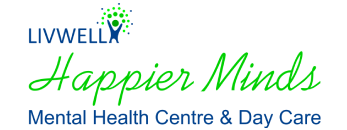- +91 91720 78857 Call Us Now
- dr.pratibha@livwellhappierminds.com Drop Us a Line
FAQ’s
Mental health refers to a person's emotional, psychological, and social well-being. It affects how we think, feel, and behave, and can impact our daily life.
Common mental health disorders include anxiety disorders, depression, bipolar disorder, schizophrenia, eating disorders, and personality disorders.
Signs of a mental health problem can include changes in mood or behavior, difficulty concentrating, changes in sleep or appetite, feelings of hopelessness or worthlessness, and increased substance use.
Ways to improve mental health include getting regular exercise, eating a healthy diet, practicing stress reduction techniques, seeking social support, and getting professional help when needed.
It is important to seek professional help for a mental health issue if symptoms persist or interfere with daily life, or if they are causing distress or impairment.
Therapy is a type of treatment for mental health disorders that involves talking with a trained mental health professional to gain insight, develop coping skills, and work on problem-solving.
Medication management involves working with a mental health professional to find and adjust medication that can help manage symptoms of a mental health disorder.
Self-care involves taking actions that promote physical, emotional, and mental health. Examples of self-care include getting enough sleep, eating a balanced diet, and engaging in activities that bring joy and relaxation.
While there is no cure for many mental health disorders, they can often be effectively managed with the right treatment, allowing individuals to lead fulfilling and productive lives.
It is normal to experience a range of emotions, including anxiety and sadness. However, if these feelings persist or interfere with daily life, it may be a sign of a mental health disorder that could benefit from professional treatment.

